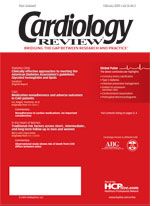Publication
Article
Cardiology Review® Online
Carvedilol reduces microalbuminuria in type 2 diabetes
Diabetes
San Francisco—Carvedilol (Coreg) significantly reduces the development of microalbuminuria compared with metoprolol (Lopressor, Toprol) in patients with hypertension and type 2 diabetes, said George L. Bakris, MD, at the 20th An-
nual Scientific Meeting of the American Society of Hypertension. This finding comes from a substudy of Glycemic Effects in Diabetes Mellitus: Carvedilol-Metoprolol Comparison in Hypertensives (GEMINI), a double-blind, multicenter study of 1,235 patients with Stage 1 or 2 hypertension and well-controlled type 2 diabetes who were being treated with either an angiotensin-converting enzyme (ACE) inhibitor or an angiotensin receptor blocker (ARB).
At the American Heart Association’s 2004 Scientific Sessions, Dr. Bakris reported that, in contrast to metoprolol, carvedilol was found to have a neutral effect on glycemic control, which was the primary end point of GEMINI.
Patients in GEMINI were randomly assigned to carvedilol, 6.25 to 25 mg twice daily, or metoprolol, 50 to 200 mg twice daily, in an effort to achieve a trough systolic blood pressure (SBP) of 135 mm Hg or less if baseline SBP was 140 mm Hg or higher, or 130 mm Hg or lower if baseline SBP was 130 to 140 mm Hg, and a trough diastolic blood pressure (DBP) of 85 mm Hg or less if baseline DBP was 90 mm Hg or higher, or 80 mm Hg or less if baseline DBP was 80 to 90 mm Hg. Hydrochlorothiazide and a dihydropyridine calcium antagonist could be added if needed to achieve blood pressure control.
Nine hundred thirty patients in the study were considered evaluable for albumin:creatinine ratio. At month 5, the albumin:creatinine ratio was decreased by 14% from baseline in patients assigned to carvedilol, whereas the albumin:creatinine ratio increased by 2.5% from baseline in the metoprolol group (P = .003 for the difference between treatment groups).
In patients who were normoalbuminuric at baseline, 6.6% of the carvedilol group progressed to microalbuminuria at 5 months compared with 11.1% of the metoprolol group (P = .03).
Microalbuminuria is a modifiable risk marker for cardiovascular disease. According to Dr. Bakris, director of the Hypertension/Clinical Research Center, Rush University Medical Center, Chicago, “prevention of its development may translate into additional cardiovascular risk reduction, an observation yet to be confirmed by clinical trials.” He added that microalbuminuria is an important variable to consider when selecting antihypertensive medications because its reduction has been shown in clinical trials to be associated with a relative reduction in the incidence of cardiovascular events compared with no reduction in microalbuminuria.
In another analysis of GEMINI, the addition of either of the beta blocking agents to ACE inhibitor or ARB therapy was effective at achieving blood pressure control, said Jackson T. Wright, Jr., MD, PhD.
In the study, target blood pressures were attained in nearly one half of patients receiving either carvedilol or metoprolol, mostly at low or medium doses, in addition to their ACE inhibitor or ARB. With adjunct therapy (diuretic ± calcium antagonist), 68% of patients assigned to carvedilol and 67% assigned to metoprolol achieved a target blood pressure of less than 130/80 mm Hg, the goal set for patients with diabetes, said Dr. Wright, professor of medicine, division of hypertension, Case Western Reserve University, Cleveland.
Failure to titrate the beta blocker to the maximal dose was observed in about 40% of the patients who did not achieve a blood pressure lower than 130/80 mm Hg. The addition of a diuretic was required in almost half of the patients to achieve goal blood pressure, he added.





